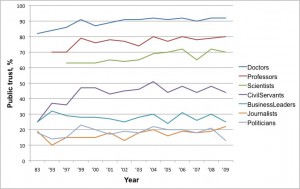One sometimes hears it said that there’s a “crisis of trust in science” in the UK, though this seems to be based on impressions rather than evidence. So it’s interesting to see the latest in an annual series of opinion polls comparing the degree of public trust in various professional groups. The polls, carried out by Ipsos Mori, are commissioned by the Royal College of Physicians, who naturally welcome the news that, yet again, doctors are the most trusted profession, with 92% of those polled saying they would trust doctors to tell the truth. But, for all the talk of a crisis of trust in science, scientists as a profession don’t do so badly, either, with 70% of respondents trusting scientists to tell the truth. To put this in context, the professions at the bottom of the table, politics and journalism, are trusted by only 13% and 22% respectively.
The figure below puts this information in some kind of historical context. Since this type of survey began, in 1983, there’s been a remarkable consistency – doctors are at the top of the trust league, journalists and politicians vie for the bottom place, and scientists emerge in the top half. But there does seem to be a small but systematic upward trend for the proportion trusting both doctors and scientists. A headline that would be entirely sustainable on these figures would be “Trust in scientists close to all time high”.
One wrinkle that it would be interesting to see explored more is the fact that there are some overlapping categories here. Professors score higher than scientists for trust, despite the fact that many scientists are themselves professors (me included). Presumably this reflects the fact that people lump together in this category scientists who work directly for government and for industry together with academic scientists; it’s a reasonable guess that the degree to which the public trusts scientists varies according to who they work for. One feature in this set of figures that does interest me is the relatively high degree of trust attached to civil servants, in comparison to the very low levels of trust in politicians. It seems slightly paradoxical that people trust the people who operate the machinery of government more than they trust those entrusted to oversee it on behalf of the people, but this does emphasise that there is by no means a generalised crisis of trust in our institutions in general; instead we see a rather specific failure of trust in politics and journalism, and to a slightly lesser extent business.
